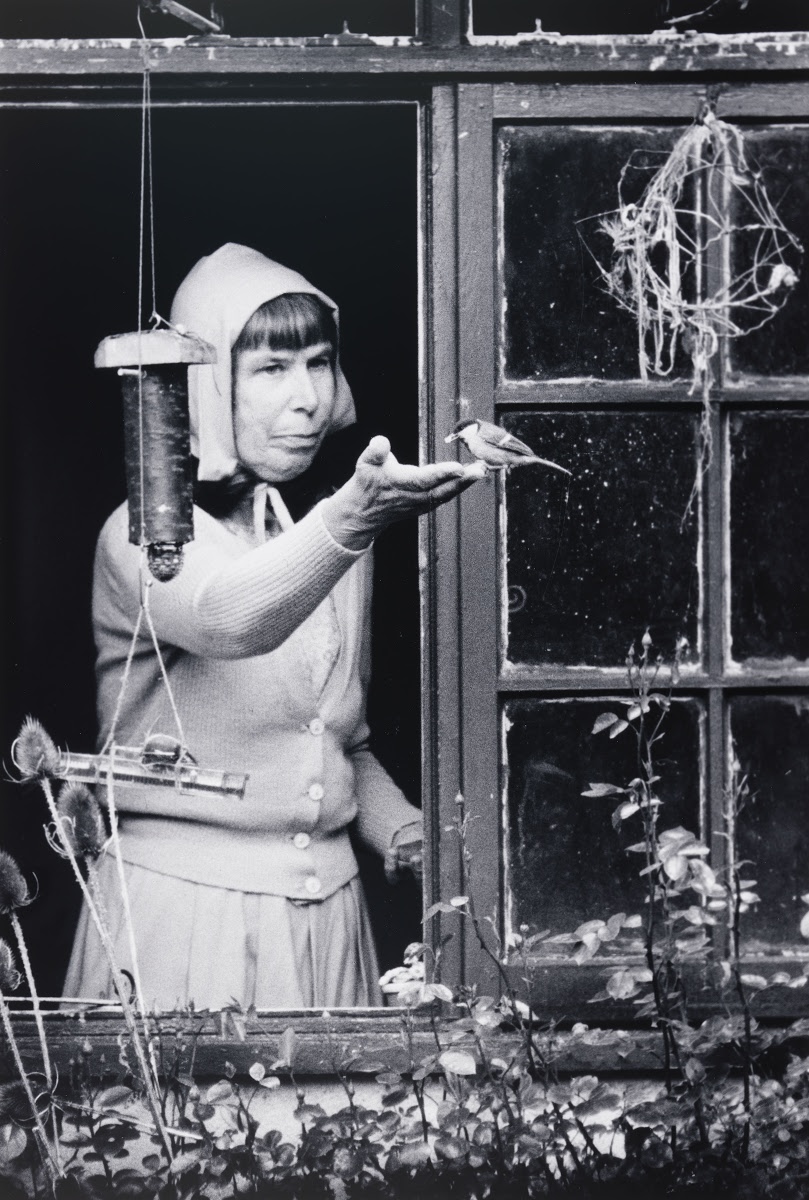
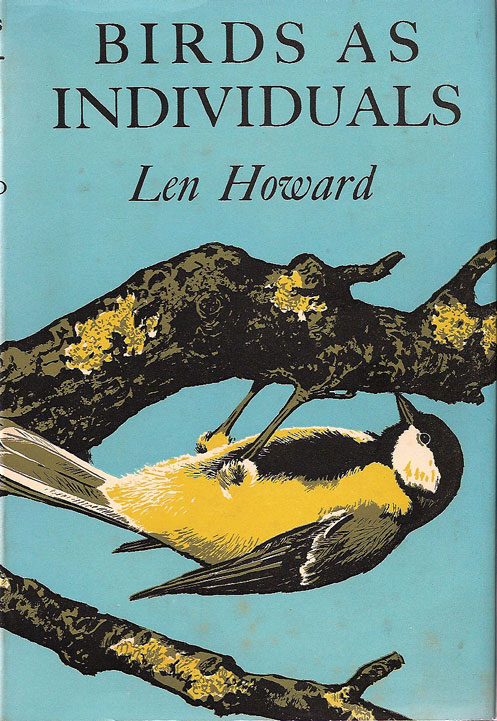
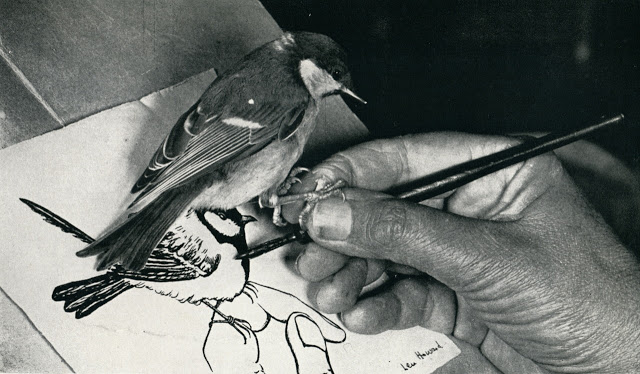
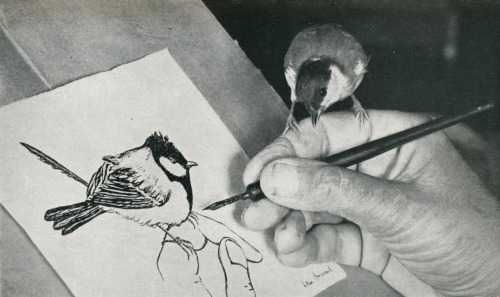
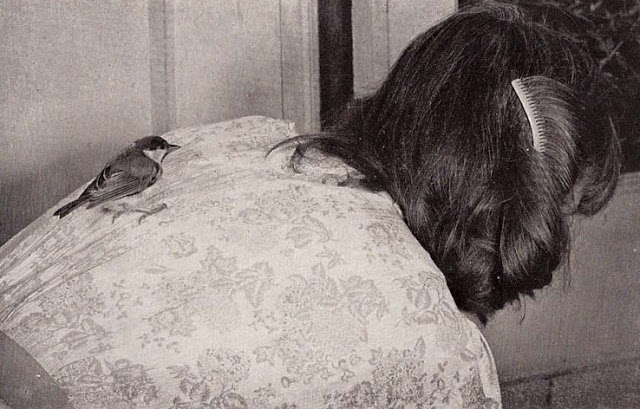
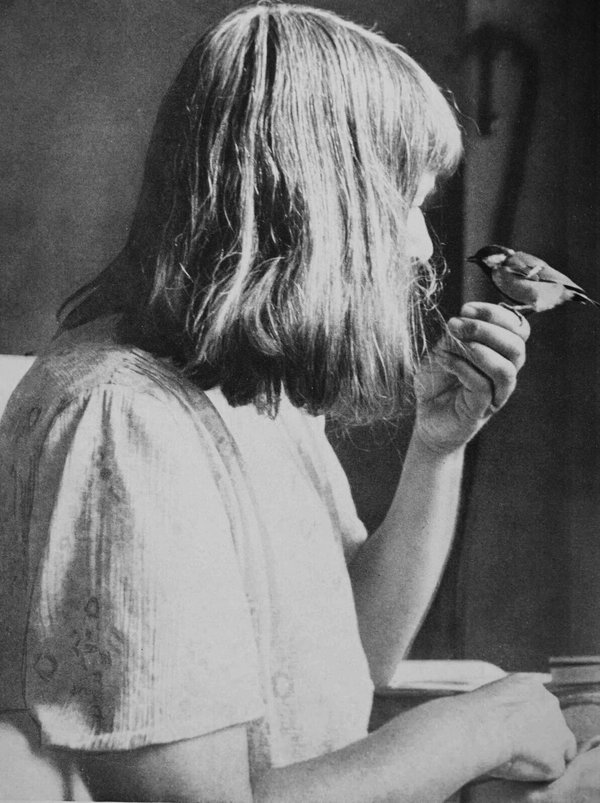
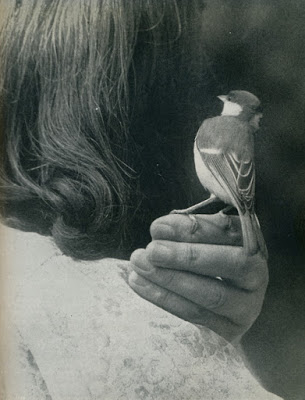
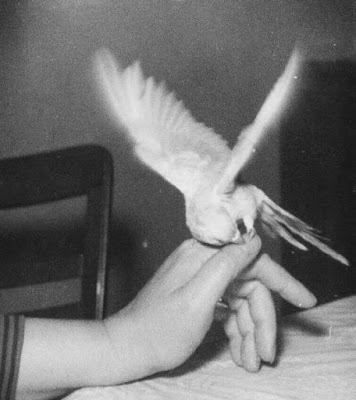
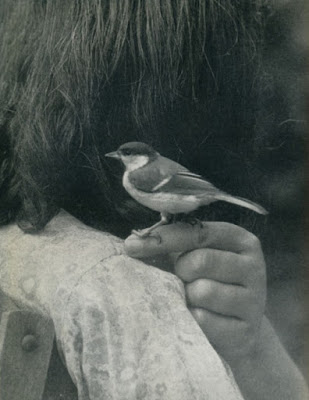
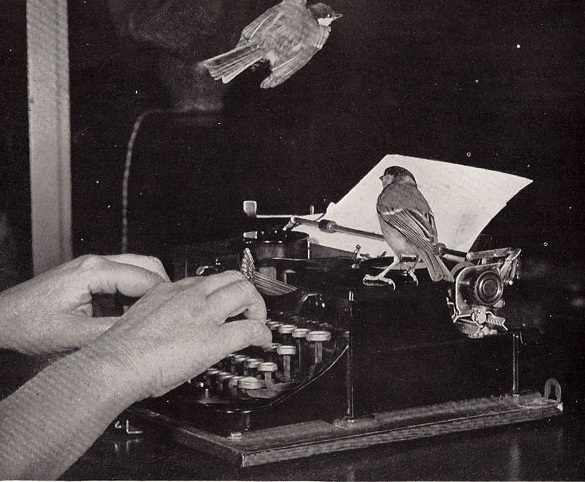
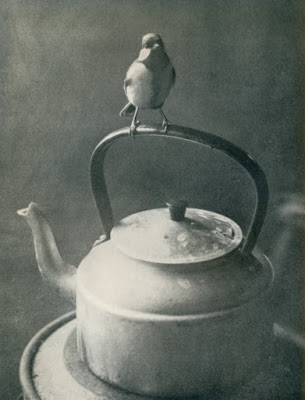
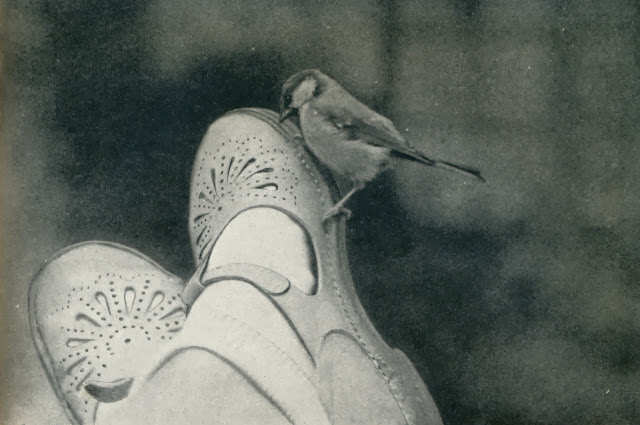
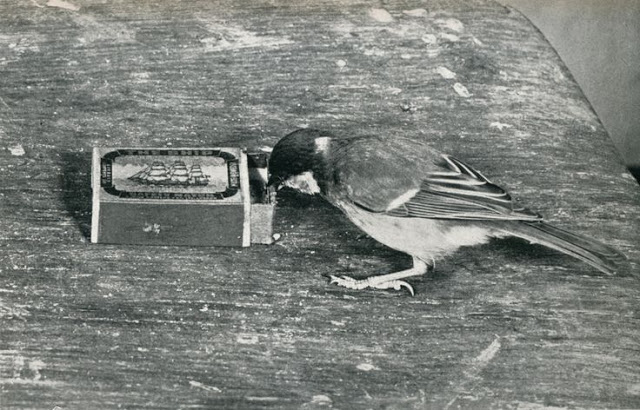
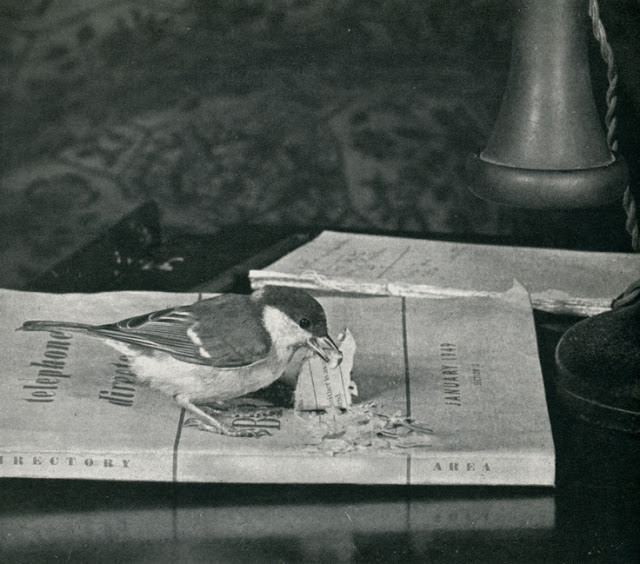
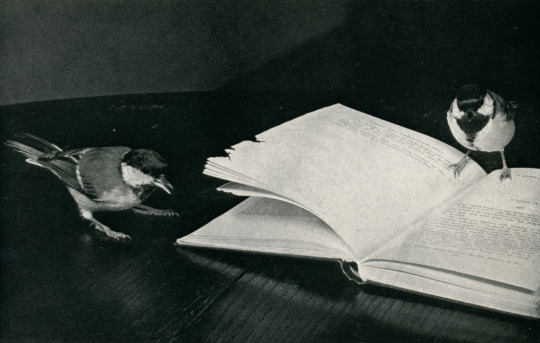
Len Howard, violiste veranderde haar leven door vogels te gaan beschouwen….
Gwendolen “Len” Howard was an eccentric who, in 1938, at the age of 44, gave up a career as a concert violinist and retreated to a cottage in the Sussex countryside to study birds. Her two books are out of print, and the scientific establishment did not take her work seriously.The Dutch author Dutch author Eva Meijer has created a fictional life for Howard based on the little that is known. Passages from her books tell the parallel life story of Star, her favourite great tit. Howard’s words are fascinating and moving. The woman herself remains an enigma.Len’s love of birds is fostered by her charismatic poet father, a man unable to see an injured bird without rescuing and nurturing it. A lively and sensitive girl, youngest of four siblings in a wealthy, cultured family, she longs to get away. Escaping to London and a prestigious career in music, she misses her tame crow far more than she misses her family. Len experiences love and friendship in this earlier part of the book, but no human relationship remotely approaches the bond she forms later with the birds of Bird Cottage. Nesting boxes cover the walls inside and out. Birds sit on her head and shoulders. She teaches them to count and makes musical transcriptions of their songs.The source of alienation is not addressed, but Meijer gives a convincing account of total dedication and self-beliefHuman contact is at a bare minimum. Her father’s death is hardly mentioned, she never writes to her mother, and can’t wait to be rid of her sister when she visits. War is noted mainly for the fact that butter for the bird tables is scarce. A deserter appears at her door, an old flame, destitute. She lets him stay a couple of days but quickly sends him on his way: the birds must not be inconvenienced. News of his subsequent arrest and execution causes less of a ripple than the prospect of building work disturbing the birds.Why such extreme withdrawal from human company? Though the source of alienation is not addressed, Meijer gives a convincing account of total dedication and self-belief, and there’s beauty and joy in Len’s strange life. An entertaining and thought-provoking read, the novel is also deeply sad, for Len believes her work is vital to the birds’ wellbeing. What we see is that her need is far greater than theirs.• Carol Birch’s Orphans of the Carnival is published by Canongate. Bird Cottage, translated by Anoinette Fawcett, is published by Pushkin. To order a copy for £8.99 (RRP £12.99) go to guardianbookshop.com or call 0330 333 6846. Free UK p&p over £10, online orders only. Phone orders min p&p of £1.99.With those in power failing us …… at this historic moment, we demand better. From the coronavirus pandemic and police brutality to the marginalisation of minority communities around the world, leadership is broken. Devoid of the humility and inclusivity we so desperately need, and given to narcissism, leaders are gambling with public health, safety and the future of younger generations. They unapologetically prioritise serving themselves over the people they were elected to serve. We have to make them raise their game.
That’s what the Guardian’s here for. As an open, independent news organisation we investigate, interrogate and expose the incompetence and indifference of those in power, without fear. Our journalism is free from political and commercial bias – this makes us different. We can give a voice to the oppressed and neglected, and stand in solidarity with with those who are calling for a fairer future. With your help we can bring about improvement.
Millions are flocking to the Guardian for quality news every day. We believe everyone deserves access to information that is fact-checked, and analysis that has authority and integrity. That’s why, unlike many others, we made a choice: to keep Guardian reporting open for all, regardless of where they live or what they can afford to pay.We’re determined to provide journalism that helps each of us better understand the world, and take actions that challenge, unite, and inspire change – in times of crisis and beyond. Our work would not be possible without our readers, who now support our work from 180 countries around the world.But news organisations are facing an existential threat. With advertising revenues plummeting, the Guardian risks losing a major source of its funding. More than ever before, we’re reliant on financial support from readers to fill the gap. Your support keeps us independent, open, and means we can maintain our high quality reporting – investigating, disentangling and interrogating.Every reader contribution, however big or small, is so valuable for our future. Support the Guardian from as little as €1 – and it only takes a minute. Thank you.
Gwendolen Howard (1894 – 5 January 1973) was a British naturalist and musician. She is known for the unique amateur bird studies that were published in various periodicals and two books under her pseudonym, Len Howard.Gwendolen Howard was the last of four children born to Henry Newman Howard (1861–1929), the British poet and dramatist, and Florence Howard, née Warman. Born in the town of Wallington, Howard lived with her family in various homes throughout England and Wales before beginning a music career in London, where she gave music lessons, organized concerts for children of the poor, and played viola in an orchestra under Malcolm Sargent.[1][2] In 1938, Howard purchased a plot of land outside the village of Ditchling and arranged for construction of the home she later called “Bird Cottage.”[3]Once resident in Bird Cottage, Howard developed an intimate, cohabitational relationship with the wild birds in the area, providing food (including her own war rations), chasing away predators, tending to damaged nests, and allowing the birds to fly and roost throughout her home. Around 1949, Howard began publishing her field notes and “bird biographies” in British natural history periodicals, and in 1950 her first book was published by Collins Press. Howard continued to write and publish about her birds until at least 1957. Believing that fear is the primary motivating factor in much of avian behaviour as observed by humans, and wanting to combat the scientific conclusions that had been drawn from such observations, Howard strove to effect great control over her and her birds’ environment so as to maximize her birds’ sense of security, and to encourage an uninhibited relationship with them. To this end, Howard was reclusive and gave strict instructions to those who ventured to visit her or contact her at Bird Cottage. Howard also undertook a public campaign in 1960 to prevent development on the land surrounding her property.[4]
In her writings, Howard argued that individual intelligence, and not mere instinct, is a factor in much of bird behaviour. Howard paid especial attention to great tits in her studies, although she also wrote about other tits, robins, sparrows, blackbirds, thrushes, and finches, among others, and singled out particularly striking individuals for her biographies. Howard’s musical training gave her unique insight into birdsong, and the final section of her first book is devoted to an in-depth analysis of this topic.Gwendolen Howard died on 5 January 1973, at Bird Cottage, at the age of 79.[5]In 2016 a novel based on Len Howard’s life and work, ‘Het Vogelhuis’, written by the Dutch author Eva Meijer, was published in the Netherlands, where it became a best-seller. It has subsequently been translated into several languages. The English translation by Antoinette Fawcett, ‘Bird Cottage’, was published world-wide by the Pushkin Press on 30 August 2018. Eva Meijer was interviewed about the book by Jenni Murray on the BBC Radio Four programme ‘Woman’s Hour’ at 10.32, and by Sean Rafferty on the BBC Radio Three programme ‘In Tune’ at 17.23, on Friday 31 August 2018. Source Wiki
Vogels als huisgenotenLen Howard‘Vogels als huisgenoten zal je blik op koolmezen voor altijd veranderen. Met haar vogelonderzoek was Len Howard haar tijd ver vooruit, en haar boeken laten zien dat vogels je vrienden kunnen worden, als je goed naar ze kijkt en luistert – en wat te eten voor ze neerzet. Wie echt wil weten wat vogels denken moet met ze gaan samenwonen – of Len Howard lezen natuurlijk.’ – Eva MeijerHoewel Len Howard nooit biologie studeerde, is ze een pionier op het gebied van onderzoek naar dieren: ze bestudeert de vogels op basis van vertrouwen en vrijheid, en observeert hun karakters, eigenaardigheden en gewoontes.In Vogels als huisgenoten beschrijft Len Howard haar leven met vogels. Ze constateert dat individuele intelligentie, en niet louter instinct, een factor is bij het gedrag van vogels. Howard besteedt speciale aandacht aan koolmezen in haar studies, maar schrijft ook over roodborstjes, mussen en merels. Howards muzikale opleiding geeft haar een uniek inzichtin vogelzang. In de vogelbiografieën stelt ze de levensverhalen van Kaalkopje, Ster, Eenoog, Tinky en Drummer op prachtige wijze te boek.Haar twee boeken over het gedrag van vogels werden in de jaren vijftig en zestig van de vorige eeuw internationale bestsellers en verschenen ook in Nederland
Gwendolen Howard (1894 – 1973) was a British naturalist and musician. She is known for the unique amateur bird studies that were published in various periodicals and two books under her pseudonym, Len Howard.
“Musicologist Len Howard conducted an 11-year study of bird music from her cottage in the English countryside. She found that birds were individuals and their behaviour was variable and flexible. It wasn’t an easy assignment. Moore had to photograph her from the bottom of the garden using a 300mm telephoto lens, as she insisted his presence would disturb the birds.”
State Library of New South Wales https://www.cocosse-journal.org/2016/07/birds-as-individuals-1952-living-with.html?m=0 the source of the photo’s.
